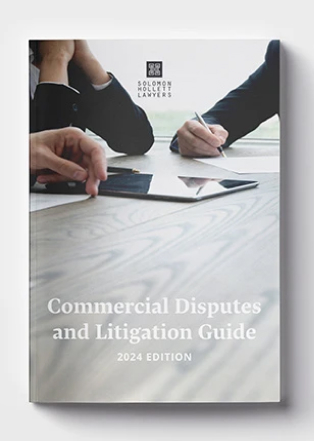Ask any law firm in Perth and they will tell you the same thing; finding yourself entangled in a business dispute can be more than just a headache. It’s often both an emotional rollercoaster and a financial pitfall that can seriously harm your business operations. And while business disputes are common in any industry, knowing how to resolve the issue can be difficult.
Alternative Dispute Resolution (ADR) is an alternative to traditional litigation. It’s a powerful alternative to court proceedings, offering a path to peace that can save your sanity and your bottom line.
The benefits of ADR cannot be understated – read on to find out more.
What is ADR?
Alternative Dispute Resolution, or ADR, covers a range of different processes and techniques designed to assist dispute resolution without the need for traditional litigation. At its core, ADR offers alternative routes to dispute resolution that are often more flexible, less formal, and can be tailored to the specific needs and circumstances of the involved parties.
ADR is administered by legal professionals who have extensive legal experience, and these ADR processes can include a broad range of techniques and processes, including mediation, conciliation, early neutral evaluation, case appraisal, referee involvement, case conferencing, arbitration and negotiation.
Common types of ADR
- Mediation is a facilitative process where a neutral third party (the mediator) works with the disputing parties to find a mutually acceptable agreement. The mediator does not decide on the outcome – they are there to help the parties communicate effectively and explore possible solutions.
- Arbitration is a slightly more adjudicative approach, where the arbitrator (or a panel of them) listens to evidence and arguments presented by both sides before making a decision. This decision is usually legally binding.
- Conciliation is similar to mediation in that a conciliator works to help the parties reach a resolution. Conciliators might play a more active role in the process than mediators and can help shape the resolution of a dispute.
- Negotiation can be informal or formal and may be facilitated by a third party, such as a mediator or arbitrator. For negotiation to work, it requires effective communication, active listening, and a willingness to understand the other party’s perspective. It also requires each party to accept that a settlement in the middle can be a much better commercial outcome, despite their prospects of success
The benefits of ADR
Navigating a dispute doesn’t need to be overly complex. ADR isn’t just a backdoor exit from legal battles; it’s a forward-thinking approach that benefits everyone involved, and provides a foundation for resolution that’s grounded in mutual respect, understanding, and efficiency.
Here are some of the best benefits of ADR.
Cost-effective
One of the biggest benefits of ADR is its potential for cost savings. Traditional litigation often comes with high legal fees, court costs, and other expenses that can accumulate fairly quickly, especially if the case goes for several months or even years.
ADR processes like mediation and arbitration can be significantly less expensive, mainly because these methods are a lot quicker to conclude and less formal, reducing the need for extensive legal preparations and court appearances. Opting for ADR means parties can allocate resources more efficiently and focus on the resolution rather than the cost of the dispute.
Time-saving
We’ve all heard the age-old saying – time is money. It’s a valuable commodity, especially in legal disputes where prolonged uncertainty can impact your personal life and business operations. The time involved when engaging in litigation can also be a distraction from your core focus of operating your business.
ADR offers a pathway to resolving disputes more swiftly than the traditional court system. With scheduled sessions and the absence of a backlog similar to that found in courts, ADR can expedite the resolution process and allow both parties to move forward sooner.
It not only saves time, but also reduces the stress and anxiety that usually come with prolonged disputes.
Confidentiality
Court proceedings are typically public, and having disputes aired to all can be stressful and even damaging to your reputation and brand. ADR offers a private and confidential setting for dispute resolution, which is crucial for individuals and businesses concerned about the public exposure of sensitive information, or the potential impact on their reputation.
In ADR processes, the details of the dispute and the terms of any settlement generally remain confidential between the involved parties, safeguarded from public scrutiny.
Control and flexibility
ADR puts the resolution process in the hands of the disputing parties. It offers more control over both the procedure and the outcome, so long as both parties are committed to reaching a resolution. Unlike a court decision, which is binding and might not satisfy any party fully, ADR allows for customised solutions tailored to the specific needs and interests of the parties.
This flexibility can lead to more creative, equitable, and mutually satisfactory outcomes. A win-win scenario.
Preservation of relationships
Litigation can often be adversarial and combative, which can irreparably damage relationships. ADR, particularly mediation, focuses on collaboration and communication, encouraging parties to understand each other’s perspectives and work together towards a mutually agreed resolution.
This approach can preserve, and sometimes even strengthen, personal or business relationships, which is especially important in disputes involving family businesses, long-term commercial relationships, or community conflicts.
Expertise
ADR allows parties to select an arbitrator or mediator with specific expertise relevant to the dispute, which is not always possible in court proceedings. This specialised guidance can be invaluable, especially in complex disputes that require the right experience in this particular legal field. It can lead to a more informed decision-making process and outcomes that are fair, practical, and informed by industry standards.
Get started with ADR today
As a business owner or manager, it’s essential to be aware of ADR processes, so you can take advantage of them when needed. At Solomon Hollett Lawyers, our dispute resolution lawyers specialise in ADR processes and can help you resolve your business disputes efficiently and confidentially.
Don’t let disputes harm your business, contact us today for a free 15-minute phone consultation and let us help you get back to doing what you do best – running and growing your business.
Please note the content within these blog posts is not intended to, and does not in fact, constitute legal advice, and must be treated as a general guide only. The content is based on Western Australian law only and is subject to change, is general and may not take into account your particular circumstances. Should you require legal advice in relation to your specific circumstances, please reach out.









